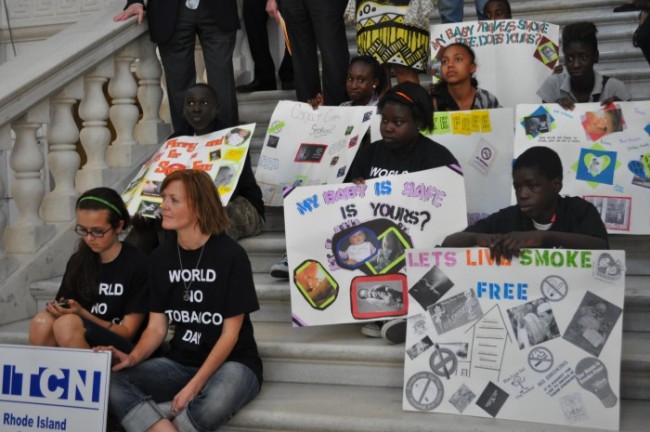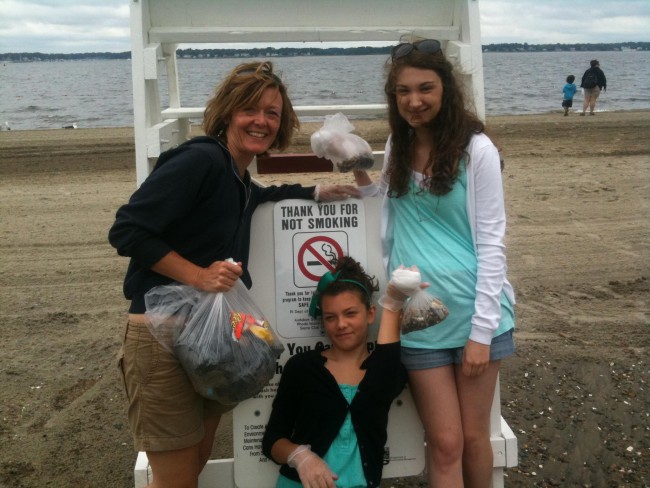Tobacco Free Rhode Island (formerly the Rhode Island Tobacco Control Network)
Karina Wood, Director
Prevention Focus: Tobacco Use Prevention and Cessation
In this interview, Karina Wood discusses Tobacco Free Rhode Island’s strategies and priorities to diminish tobacco use in Rhode Island.
First and foremost, what is Tobacco Free Rhode Island (TFRI)?
Tobacco Free Rhode Island (formerly the Rhode Island Tobacco Control Network) is a state-wide network of about 50 organizations. Networks like ours exist in most states and members range from health policy groups to health providers to community organizations. All organizations work to decrease tobacco use and prevent youth from taking tobacco up.

Karina Wood, Director
TFRI is a policy-oriented network aimed at bringing change at both the municipal and state levels. By advocatating for strong laws and regulations, RI can reduce tobacco-related diseases and deaths by eliminating exposure to second-hand smoke, promoting quitting, and preventing youth from starting to smoke. For example, by working to increase funding for the Tobacco Control Program at the RI Department of Health, it can provide more services and resources like the free smokers QuitLine (1-800-QUITNOW) and fund media campaigns to educate people about the health dangers of tobacco.
TFRI also works at the city- and town-levels to pass ordinances. For example, by trying to get flavored tobacco products off counter-tops and behind the counters with the cigarettes, we hope to get flavored tobacco out of the hands of kids. The City of Providence was successful with their ordinances and beat big tobacco in a lawsuit to uphold them.
One of our priorities over the last few years has been trying to raise the state tax on cigarettes. The higher the price of the tobacco product, the harder it is for youth to afford it, which is a real disincentive for youth to start smoking. Data from across the country show that high prices cut tobacco use down.
How does TFRI work with the different types of organizations that are part of the network?
Good communication is key to our success; through our website, Facebook page, and email list, we send updates, news, and information.
With regard to our legislative agenda, a policy committee made up of American Lung Association, American Heart Association, American Cancer Society, Rhode Island Medical Society, Rhode Island Public Health Association, and Campaign for Tobacco Free Kids provide recommendations for the priorities each year and the whole network discusses those recommendations every September. We usually pick one or two legislative matters, and more municipal advocacy and press issues. The beauty of having a network is that we all move forward based on commonly agreed upon priorities in a coordinated way.
As the director, my role is to ensure that everything moves forward and to coordinate the policy committee and the local activists. For example, we are arranging a packet for the Governor to ask for increased funding for the Tobacco Control Program at the Rhode Island Department of Health. I am bringing the different organizations that are creating materials together and aggregating the components to send to the Governor’s Office.
What was the policy agenda of TFRI last year? Why were these areas targeted?
One of our priorities for 2013 was to increase the Tobacco Control Program’s budget. The Centers for Disease Control (CDC) recommends that the state provides $15,000,000 in every state to fund the program, but in RI, it only provides $400,000, which is woefully underfunded. We are lobbying to increase to $3,100,000, which would be the highest rate it has been funded at in the last 10 years. If the budget doubled, it would still be less than a million dollars but we would be thrilled. Because funding has been so low, legislators have trouble envisioning what a well-funded program could do. Furthermore, legislators often don’t know what the funding goes to so we bring in key individuals (former smokers, high school students, and those with smoking-related health complications) to testify on the importance of the funding.
Connected to that, another priority was to increase the tobacco tax by $0.90 on every pack of cigarettes. That additional tax would bring in close to $15 million. If $3 million of that revenue went to fund the Tobacco Control program, the rest could be used to support other government programs. As the tax brings in revenue that the State really needs, it would also cut smoking rates. Unfortunately, many legislators believe the tax is high enough already. At TFRI, we believe that the tax will be recognized as a viable revenue stream eventually and will be raised.
Finally, last year the tobacco industry promoted a bill to prevent minors from buying e-cigarettes. We needed to be reactive. At first, it looked like a good bill, but it was suspicious that no one in the tobacco control field had worked on it. We found out that R.J. Reynolds, the tobacco company, had coordinated the same bill to be introduced in at least 27 other states. R.J. Reynolds wanted to make sure that legally they were not marketing to minors when they released their e-cigarette product. More importantly, the bill would define electronic cigarettes separately from tobacco products. If the law at the state-level says that e-cigarettes are not tobacco products, they can’t be regulated like cigarettes, can’t be taxed like tobacco and can be treated separately. Unsupported claims could be made that e-cigarettes are a “health product” or a “harm-reduction product.” We convinced the House sponsor to drop the bill, but the Senate sponsor refused. He got the bill through the Senate, but we convinced the Governor to veto it. We had a victory at the end of the session on a really complicated bill that we didn’t plan on!
What are some of the challenges that TFRI continues to face?
Tobacco reduction is a victim of its own success. Compared to a lot of other states, RI has been successful with tobacco control and prevention over the years. Rhode Island has the third lowest youth smoking rate in the nation, and our adult smoking rate has dropped to 17 percent. The public and legislative perception is that the fight is over, because when tobacco is not in the headlines it becomes quiet politically even though it’s still a huge public health problem.
In RI, our smoke-free laws have been very successful. Now high smoking rates are primarily in low-income communities, communities of color, people with substance abuse issues, and people with mental illness. These are people who are disenfranchised politically and are not seen in the public profile. We must overcome this problem. We need to own the good news, but we still have a lot to do. Roughly one-in-five people in Rhode Island are smoking and it is too many! We have hit this plateau where 17% of the population is hardcore smokers. Ten years ago, we had much higher smoking rates, but different types of smokers.
The tobacco industry continues to find loopholes in the legislation and regulations and it is a challenge for us. For example, today youth are smoking a lot of little cigars. Little cigars are allowed to be flavored, but cigarettes are not. They are cheaper because they aren’t subject to the same taxes as cigarettes; this is because they are in a different size category. Providence banned little cigars outright. The tobacco industry took the city to court, but the judge upheld the law. It was an expensive fight but definitely worth it. Other town and cities, not just in Rhode Island but around the country, now have a precedent for it. Sometimes passing legislation city-by-city is the best way to do it because city officials often are closer to their constituents and have fewer people to convince. A two-pronged approach, engaging action at both the states and city-levels, is necessary.
What’s next for TFRI? What are some upcoming events for TFRI?
We are excited to be working on a new e-cigarette bill with legislators. We are also going to keep working to increase the tobacco tax and are looking for a new way to do that.
At the municipal policy level, we are hosting our first summit, on November 15th at the Warwick Public Library. We are trying to convene activists, governmental leaders, mayors, and city council leaders. There is a lot to get done at the municipal level. There is a lot of potential, especially since we are on the coattails of the victory of Providence. People are feeling empowered. Mayor Tavares will be at the summit to discuss the great success of tobacco prevention in Providence. Mayor Diossa of Central Falls will be discussing the smoke-free public spaces ordinance that went into effect last year.
Every year our partner organizations participate in the Great American Smokeout, hosted in November by the Cancer Society. In the spring, there is a Kick Butts Day that the Campaign for Tobacco-Free Kids runs.
Next year we have important anniversaries to highlight. January is the 50th anniversary of the groundbreaking Surgeon General’s Report on Tobacco and Health. In 2014 and 2015, it will be the 10-year anniversary of the vote on the smoke-free workplaces law and then when it went into effect.
We have done a lot but we still have much to do. With the steady decline in cigarette sales, Big Tobacco is now pushing new products like electronic cigarettes and nicotine candies. We need to protect kids from all tobacco and nicotine products, and keep working until the smoking rate is almost non-existent.



